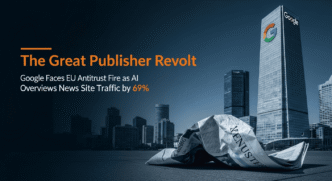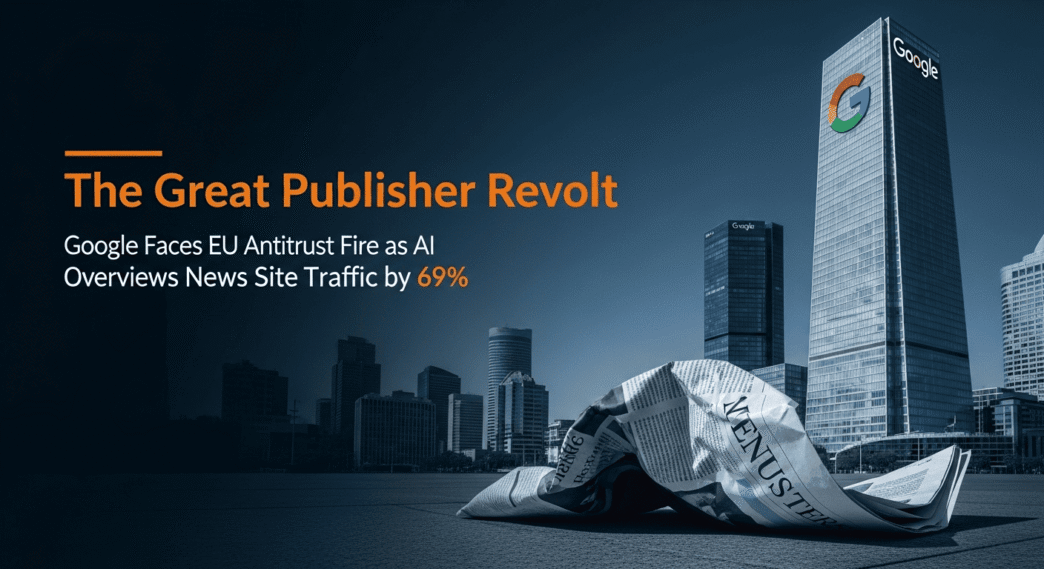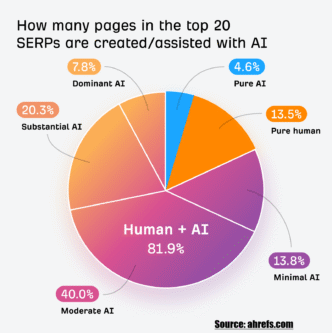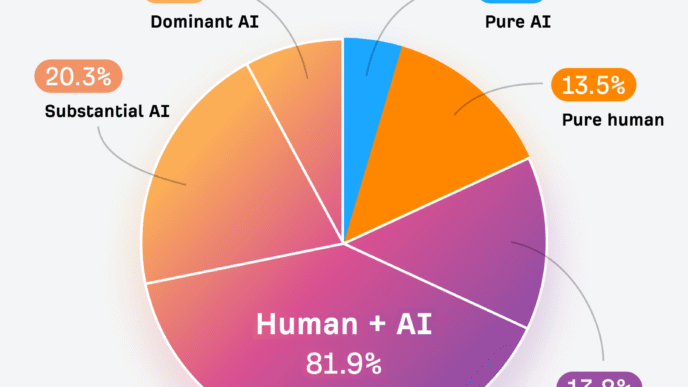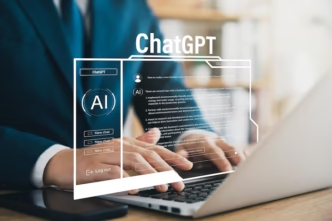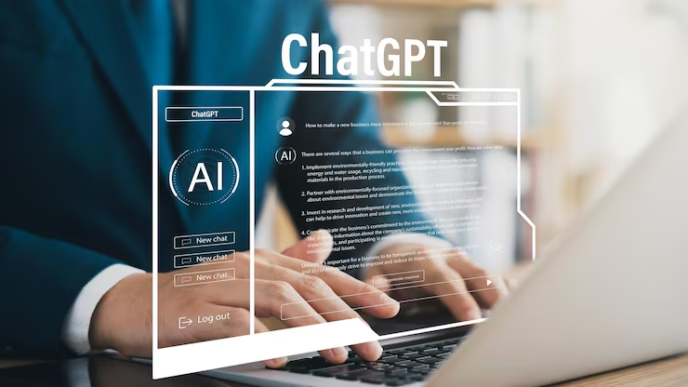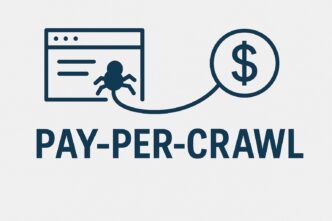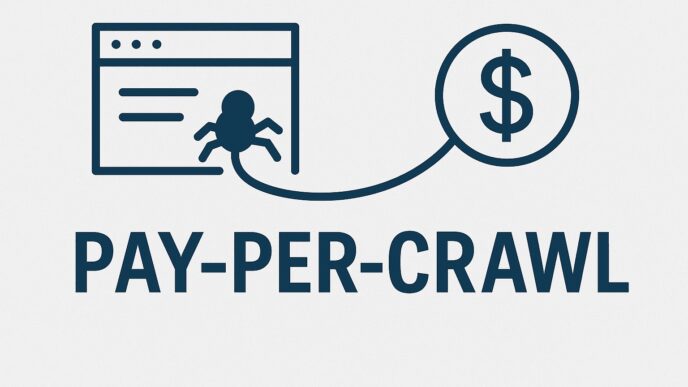Independent publishers launch coordinated legal assault against Google’s AI summaries, claiming “existential threat” to journalism
A coalition of independent publishers has declared war on Google’s AI Overviews feature, filing a bombshell antitrust complaint with the European Commission that could fundamentally reshape how artificial intelligence interacts with original content.
The complaint, submitted on June 30, 2025, represents the most significant legal challenge to date against AI-powered search features, with publishers claiming Google’s AI summaries are systematically destroying their traffic, revenue, and very survival.
Table of Contents
ToggleThe Smoking Gun: Traffic Massacre Revealed
New data from digital intelligence firm SimilarWeb paints a devastating picture of AI Overviews’ impact on the news industry. The statistics are staggering:
- 37 of the top 50 US news domains suffered year-over-year traffic declines since AI Overviews launched in May 2024
- Zero-click news searches skyrocketed to 69% in May 2025, up from 56% the previous year
- CNN.com alone lost 28% of its traffic, dropping to 311.7 million visits year-over-year
The carnage extends beyond news sites. Travel and tourism sites saw traffic plummet 20%, while e-commerce, finance, and lifestyle sites all reported significant declines.
“Misusing Our Content”: The Core Allegations
The Independent Publishers Alliance, backed by The Movement for an Open Web and UK nonprofit Foxglove Legal, accuses Google of systematically abusing its search dominance.
“Google’s core search engine service is misusing web content for Google’s AI Overviews in Google Search, which have caused, and continue to cause, significant harm to publishers,” the complaint states.
The publishers’ most damning allegation: Google offers no escape route. Publishers cannot opt out of having their content used for AI training and summaries without completely disappearing from Google Search results.
“Publishers using Google Search do not have the option to opt out from their material being ingested for Google’s AI large language model training and/or from being crawled for summaries, without losing their ability to appear in Google’s general search results page,” the complaint declares.
“Existential Threat”: Publishers Fight for Survival
Rosa Curling, co-executive director of Foxglove Legal, didn’t mince words: “Independent news faces an existential threat: Google’s AI Overviews.”
The numbers support her alarm. Click-through rates for the top organic search result have collapsed from 7.3% in March 2024 to just 2.6% by March 2025 on queries that trigger AI Overviews.
Raptive, which represents 5,000 independent content creators, initially estimated AI Overviews could cost the industry $2 billion in annual ad revenue. Chief Innovation Officer Marc McCollum now believes that figure is “maybe on the very low end.”
Google’s Defense: “More Opportunities, More Discovery”
Google fired back with its standard defense playbook, claiming AI features actually help publishers.
“New AI experiences in Search enable people to ask even more questions, which creates new opportunities for content and businesses to be discovered,” a Google spokesperson said.
The tech giant argues it sends “billions of clicks to websites each day” and blamed traffic losses on seasonal demand, changing user interests, and regular algorithm updates rather than AI Overviews.
But publishers aren’t buying it. The data tells a different story.
Global Legal Tsunami Building
This isn’t an isolated European action. The complaint represents part of a coordinated global assault on Google’s AI practices:
- United States: An educational technology company has already sued Google, claiming AI tools devalue original content
- United Kingdom: The UK’s Competition and Markets Authority confirmed receiving a parallel complaint
- Broader Context: Google faces multiple EU antitrust investigations and has already been found guilty of search and advertising monopolies in US courts
The Revenue Massacre: Following the Money
The financial implications are staggering. About a third of traffic for the top 100 publishers comes from Google, according to SimilarWeb data. For major outlets like The New York Times, that translates to approximately 250 million visits.
Other publishers are even more dependent:
- Forbes: 72% of organic traffic from Google
- USA Today: 60% from Google
- Business Insider: 60% from Google
- Newsweek: 60% from Google
When Google’s AI summaries answer user questions directly, these publishers lose not just traffic but the advertising revenue that keeps newsrooms running.
The Bigger Picture: AI vs. Original Content
This battle extends far beyond Google. The complaint touches on a fundamental question reshaping the digital economy: How should AI systems that train on copyrighted material interact with and compensate original content creators?
Google has also been adding advertisements to AI Overviews since May 2025, potentially monetizing publisher content without sharing revenue.
The European Commission declined to comment on the specific complaint, but the timing is significant. Google already faces EU charges for unfairly favoring its own services and risks fines up to 10% of its global annual revenue.
What’s Next: Battle Lines Drawn
Publishers are demanding immediate interim measures to prevent further “irreparable harm” while the investigation proceeds. They want the ability to opt out of AI training and summaries without losing search visibility entirely.
The outcome could set global precedents for how AI systems use original content, potentially forcing tech giants to implement revenue-sharing mechanisms with content creators.
For publishers, this isn’t just about money—it’s about survival. As independent journalism faces an uncertain future, the EU antitrust complaint represents perhaps their last, best hope for forcing Big Tech to play fair.
The revolution has begun. The question now is whether regulators will side with the algorithms or the journalists who still believe original reporting matters.
Sources:
- Reuters exclusive report by Foo Yun Chee (July 4, 2025)
- SimilarWeb traffic analysis data (May 2024-May 2025)
- Independent Publishers Alliance complaint filing (June 30, 2025)
- European Commission regulatory filings
- UK Competition and Markets Authority confirmations
- The Wall Street Journal publisher traffic analysis
- TechCrunch AI search impact reporting
- Digiday publisher revenue analysis
- The New York Post traffic data compilation

